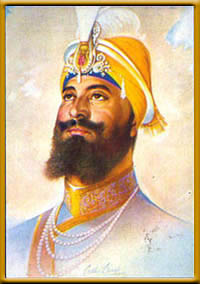The special guru

Guru Gobind Singh
Guru Gobind Singh Ji (December 22, 1666 in Patna, Bihar, India - October 7, 1708) was the tenth and last of the Ten human form Gurus of Sikhism. He became Guru on November 11, 1675 at the age of nine, following in the footsteps of his father Guru Teg Bahadur Ji. Before Guru Ji left his body, he nominated Sri Guru Granth Sahib Ji (SGGS) as the next perpetual Guru of the Sikhs. Guru Gobind Singh moulded the Sikh Religion into its present form today with the formation of the Khalsa and finished the Guru Granth Sahib which some will say was his greatest act.
"If we consider the work which (Guru) Gobind (Singh) accomplished, both in reforming his religion and instituting a new code of law for his followers, his personal bravery under all circumstances; his persevering endurance amidst difficulties, which would have disheartened others and overwhelmed them in inextricable distress, and lastly his final victory over his powerful enemies by the very men who had previously forsaken him, we need not be surprised that the Sikhs venerate his memory. He was undoubtedly a great man." (W, L. McGregor)
The tenth Guru (teacher) of the Sikh faith, was born Gobind Rai. It may not be out of context to say here that throughout the chronicles of human history, there was no other individual who could be of more inspiring personality than Guru Gobind Singh. Guru Gobind Singh Ji infused the spirit of both sainthood and soldier in the minds and hearts of his followers to fight oppression in order to restore justice, peace, righteousness (Dharma) and to uplift the down-trodden people in this world.
It is said that after the martyrdom of Guru Tegh Bahadur, the tenth Master declared that he would create such a Panth (Sect) which would challenge the tyrant rulers in every walk of life to restore justice, equality and peace for all of mankind. As a prophet, the Guru is unique. His teachings are very scientific and most suitable for all times. Unlike many other prophets he never called himself God or 'the only son of God.' Instead he called all people the sons of God sharing His Kingdom equally. For himself he used the word 'slave' or servant of God.
"Those who call me God, will fall into the deep pit of hell. Regard me as one of his slaves and have no doubt whatever about it. I am a servant of the Supreme Being; and have come to behold the wonderful drama of life."
Extracts from Guru Gobind Singh's writings;
"God has no marks, no colour, no caste, and no ancestors,
No form, no complexion, no outline, no costume and is indescribable.
He is fearless, luminous and measureless in might.
He is the king of kings, the Lord of the prophets.
He is the sovereign of the universe, gods, men and demons.
The woods and dales sing the indescribable.
O Lord, none can tell Thy names. The wise count your blessings to coin your names." (Jaap Sahib)